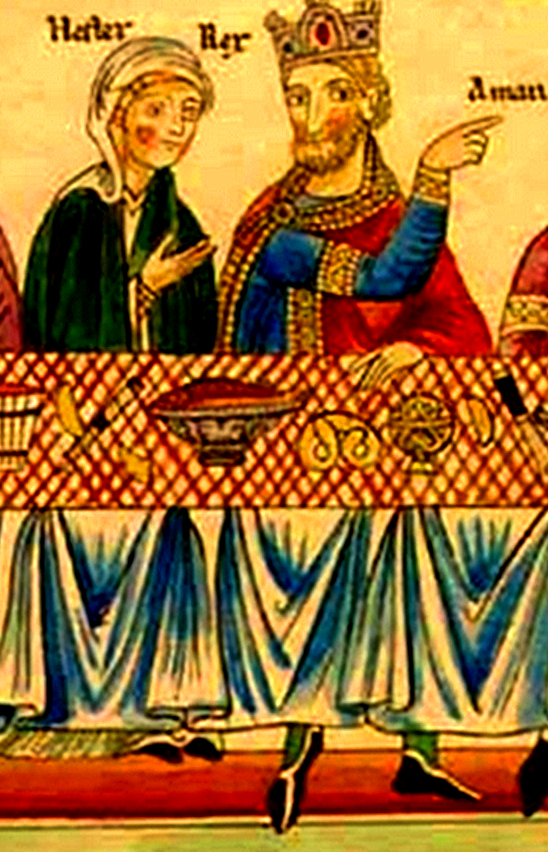Might an early medieval missionary have used pretzels as treats for children? Maybe.
The fifth century Codex 3867 in the Vatican Library has an illustration of something like a pretzel, whose twists resemble arms crossed across the chest, like someone in prayer. Although the first known use of pretzel dates to the 19th century, the word is derived from the German Brezel, which come from the Latin brachiatus, meaning having branches like arms.

A 12th century illustration of Esther and Ahashuerus at a banquet, with a pretzel (public domain, via Wikimedia Commons).
Because pretzels required only flour, water, and salt, they kept well, long enough for a missionary or a conquering army to take to a far-away land. Travel in those days was slow, 12 to 15 miles a day. That is, if no one broke a wheel, got sick, had to deal with ill or injured animals, or was attacked by bandits.
The pretzels’ shape gave them special significance during Lent, when the faithful abstained from meat, dairy, and eggs. Pretzels were among the acceptable foods and probably among the few available as peasants’ food stores dwindled in the early spring.
With this possibility, I used something like a pretzel in The Ashes of Heaven’s Pillar. Even though the events at the beginning of the book occur in the height of summer, it isn’t too much of a stretch to imagine missionaries would want to build a rapport with the youngest of their converts and remind them to pray, as you will see in this excerpt.
When prayers ended, one of the guards approached Leova and gestured for her to hold out her hands. Leova did so stiffly. The guard plucked at the bonds on Leova’s swollen, chafed wrists. Then he knelt by Leova’s feet as if he were going to untie the rope at her ankles. Instead, his hand slid under her skirt and up her calf.
Leova flushed. Oh, how she longed to kick him in the teeth, but it would only make matters worse. She drew in a sharp breath. If Deorlaf saw this, he would rush to defend her honor, just as his father would, and try to fight the guard. A vision of Deorlaf beaten and stabbed flashed before her. She glanced at her son standing a few paces away. A smiling Saxon priest from Britain bent over him and Sunwynn. Holding small strangely twisted rolls, he was telling them about a story about Jesus and children.
She had little time while her children were distracted. Gritting her teeth against the ache in her legs, she stepped back. “Stop this nonsense before Count Pinabel sees you,” she hissed. Although she doubted the guard understood her, she hoped invoking Pinabel’s name would stop him.
Sources

I can only imagine how bland some of those snacks tasted. Mustard makes everything better. You’d need some spices to make those things palatable.
LikeLike
Well, mustard seeds are mentioned in the Bible, and it wouldn’t surprise me if the plants were grown in medieval gardens. However, I like those salty treats (soft and crunchy) even without mustard.
LikeLike